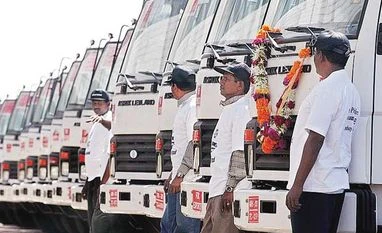According to Ashok Leyland, Nissan has been using a part of the equipment imported under the export promotion capital goods (EPCG) scheme to manufacture products other than that of the JV, which is a violation of the terms of the contract. It is to manufacture light commercial vehicles (LCVs) that the two auto firms have formed the JV - Ashok Leyland Nissan Vehicles.
When contacted, Ashok Leyland refused to offer any comment saying the matter is sub-judice. A Nissan spokesperson said: “We are not in violation of any of the terms of our agreements with Ashok Leyland and (we) dispute their claim. Import duty on the machines is due because exports by the JV did not reach the expected level. We are cooperating with the authorities to resolve this matter.”
Ashok Leyland has filed an affidavit in a district court in Kancheepuram. The affidavit, reviewed by Business Standard, states the Directorate General of Central Excise Intelligence has made an inspection at the site of Renault Nissan Automotive India and found certain EPCG assets were wrongfully used for manufacturing cars for Nissan.
In view of these findings, the director-general asked the JV to explain the violations and also to refund the EPCG benefits it availed.
Following this, Renault-Nissan proposed to pay Rs 24 crore duty to be able to use the equipment to manufacture other products than that of the JV.
An official, who is close to the JV, said it was surprising it took four years for Ashok Leyland to realise its partner was using the equipment to manufacture cars. He also questioned the need to file a public suit, while JV agreement offers the option of arbitration.
According to Ashok Leyland, the JV was not able to convene a board meeting due to the “non-co-operative attitude” of the other partner, forcing the former to opt for legal remedy.
While Nissan did not respond to specific questions, the official cited above said the company would ask its JV partner to come out with a business plan to revive the loss-making venture. He said Nissan had stopped the production of Evalia, which was the only LCV product it was manufacturing and selling, while Ashok Leyland continued to manufacture and sell Dost, Partner and MiTR. Eight per cent of the revenue from Ashok Leyland comes from LCV business.
Nissan was manufacturing its product at its Oragadam facility, while Ashok Leyland has been manufacturing its LCVs at its facilities. The partners were supposed to set up a new field facility near Chennai to manufacture LCVs, but the project did not take off due to “bad market conditions”.
According to sources, Nissan forced the JV to write off capital attributable to its products Evalia/Stile, thereby bringing the JV’s net worth to negative. The official also said Nissan was ready to sell its stake to Ashok Leyland, which initially showed interest but pulled out later. Both the companies did not offer any comment on this front.
)